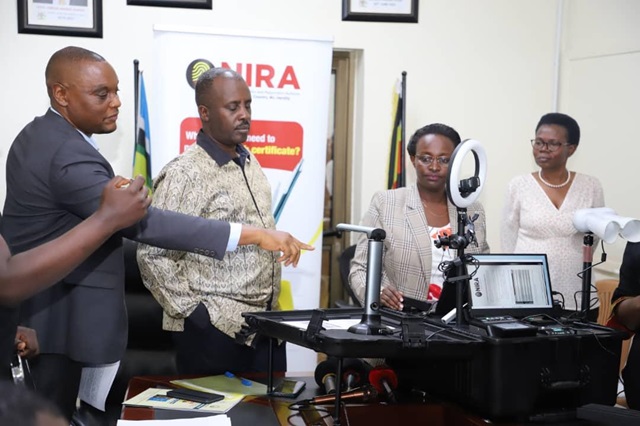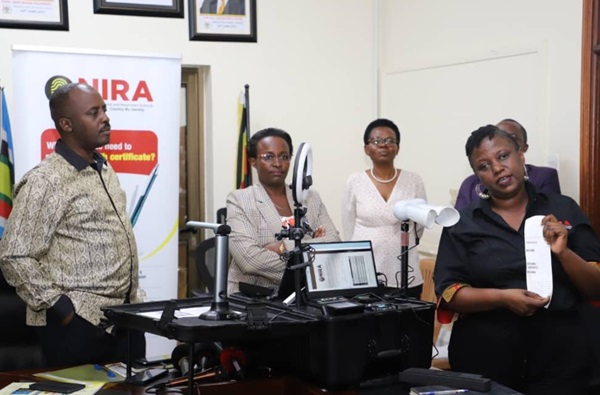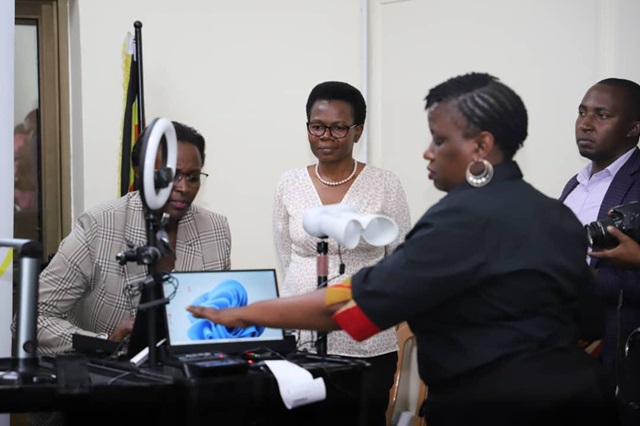
Kampala, Uganda | THE INDEPENDENT | The National Identification and Registration Authority (NIRA) is awaiting 5,680 biometric kits that include iris scanners before it starts the delayed mass enrollment and ID card renewal exercise of Ugandans in October. DNA will however not be picked, and, sample kits to be used have been displayed to the media today.
Gen David Muhoozi, Minister of State for Internal Affairs and NIRA Executive Director, Rosemary Kisembo told the press in Kampala today that the system to be used will be in the country in October, ahead of a Novemeber 30th 2024 deadline set by the Electoral Commission to receive data.
NIRA is required to deliver data to Electoral Commission that will be used in the national voters’ register ahead of the 2026 general elections.
NIRA aims to capture details of 17.2 million Ugandans who are unregistered, and renew national IDs of 15.8m, using a new system that includes five modules; NID card renew module, New registration module, Replace card module, Change of particulars module, and Get First ID module. Government will hire 13,000 personel to execute the mass enrollment exercise at 10,717 parishes across the country.

With about 15.8 million Ugandan National IDs set to expire between August 2024 to December 2025, Government has decided to extend the validity of all these cards by one year.
“The fisible date for the execise to commence when the new system is in place, is, October 15th 2024. During the period leading up to October 15th, persons aged 16 and above, or those who will be 18 by January 2026, are encourage to register to get a National Identification Numbers (NIN) using the current registration system,” Muhoozi said, adding that registration continues, and they are not waiting for the new system.
“As we speak registration continues… not that we are waiting for a start date. Those who can should continue registration, and we think we have about 3 million to handle.”
“This is therefore to emphasis that no one will be disenfranchised due to new system acquisition related issues.”
NIRA officials said one of the advantages of iris recognition is high degree of accuracy. Unlike other biometric techniques, such as fingerprint or face recognition, the probability of two irises being identical is extremely low. This, they said, ensures that the chances of false acceptance or rejection are minimal, making it a trusted identification method for various applications.
The new registraton kit features different from the old one is a portable solar kit, additional battery and Iris scanner.
NIRA is integrated with 90 users like border posts that can continue to access information on the renewed cards.
NIRA has 90 institutions integrating with NIRA’s third party interface. These institutions among others include telecommunication companies and banks who are key verifiers and can still validate in real-time biometric and biographic data.
When the new system arrives, NIRA will commence online pre-registration followed by the capturing of biometrics at the Parish level 02-03 weeks after the online preregistration exercise. The logic, Muhoozi said, is to allow for deployment of the registration kits which will be delivered in batches.
“Because we need time in between to ensure that business continues and people aren’t disrupted, that anxiety you alluded to and we have done so by extension of one year plus or minus so that we ensure that people don’t get upset by what they do,” Muhoozi told the committee.
The pic below is depiction of facial changes that an individual might get over time, and yet NIRA is expected have an update National Identification Register. Even without an expiry on the card, the material used becomes (unrecognizable) unreadable after 10 years. https://t.co/0WQ0dj9P0u pic.twitter.com/tHSRU30f7J
— Peter Okwalinga Jr. (@Oquals) August 15, 2024
On expiry of Ids, NIRA has previously explained that because several features on the IDs degenerate mainly because of wear and tear, including changes in facial features. To ensure they have up to date data on users of the IDs, they have to be renewed before they cannot be read by their systems.
He explained that the extension would be done through a Statutory Instrument Amendment No.2, Regulations 2024 already published in the gazette on 12th August 2024. “… So the IDs that were due to expire within that period will be extended by one year. This should sort the anxiety that was starting in the public regarding on, what do we do, between now and when we get the new IDs? ,” said Muhoozi.
NIRA Executive Director, Kisembo early this month explained what registration equipment is being awaited.
Kisembo told journalists, “there are eight key items that we need to arrive in the country: the data center, registration kits, card printing equipment, blank cards, and the completion of system customization. These are the items on the critical path.”


She also revealed that the National ID registration has never stopped. Despite the arrangements by NIRA to organize Mass enrollment exercise, an individual can still go to any of the offices and be enrolled.
“During this period one can visit any NIRA office to register for a NINs (citizens from 0-15 years), National ID cards (citizens 16+years), replace their cards, apply for change of particulars on their cards even before the commencement of the exercise. Procedures can be accessed from the NIRA website, socials, toll free No. 0800211700 or by visiting any NIRA office,” NIRA said in a statement.
Press Statement by Gen. David Muhoozi Minister of State for Internal Affairs during a joint presser with @NIRA_ED earlier today:
“The mass enrolment and renewal exercise for National Identity Cards involves the following activities some of which have taken place and others are… https://t.co/PcZkgSxhZs pic.twitter.com/cQSIddIOmq
— NIRA (@NIRA_Ug) August 16, 2024
 The Independent Uganda: You get the Truth we Pay the Price
The Independent Uganda: You get the Truth we Pay the Price



